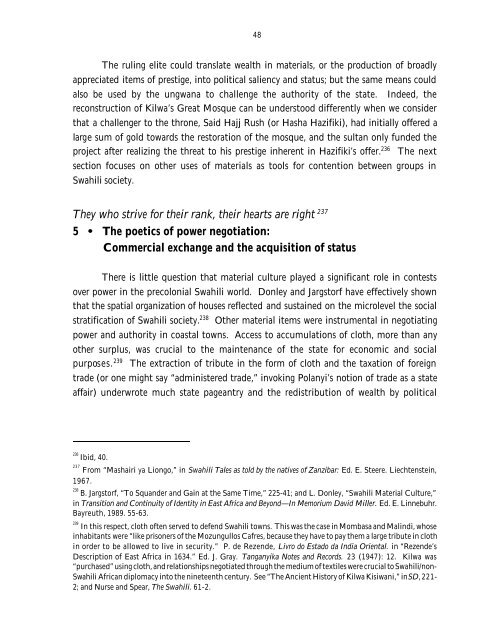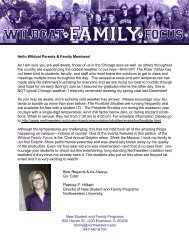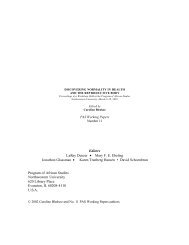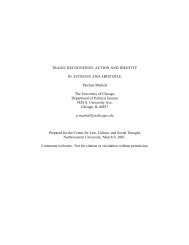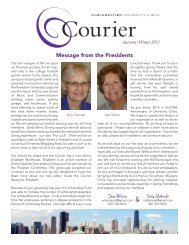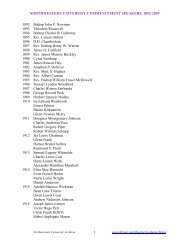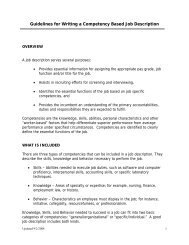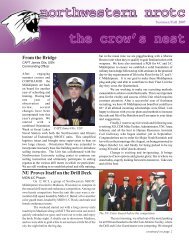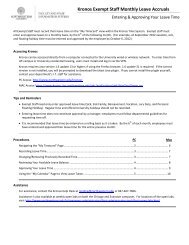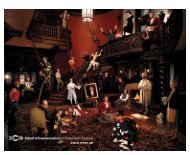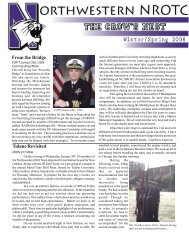Artistry Permits and Custom May Ordain - Northwestern University
Artistry Permits and Custom May Ordain - Northwestern University
Artistry Permits and Custom May Ordain - Northwestern University
Create successful ePaper yourself
Turn your PDF publications into a flip-book with our unique Google optimized e-Paper software.
236 Ibid, 40.<br />
237<br />
48<br />
The ruling elite could translate wealth in materials, or the production of broadly<br />
appreciated items of prestige, into political saliency <strong>and</strong> status; but the same means could<br />
also be used by the ungwana to challenge the authority of the state. Indeed, the<br />
reconstruction of Kilwa’s Great Mosque can be understood differently when we consider<br />
that a challenger to the throne, Said Hajj Rush (or Hasha Hazifiki), had initially offered a<br />
large sum of gold towards the restoration of the mosque, <strong>and</strong> the sultan only funded the<br />
project after realizing the threat to his prestige inherent in Hazifiki’s offer. 236 The next<br />
section focuses on other uses of materials as tools for contention between groups in<br />
Swahili society.<br />
They who strive for their rank, their hearts are right 237<br />
5 �� The poetics of power negotiation:<br />
Commercial exchange <strong>and</strong> the acquisition of status<br />
There is little question that material culture played a significant role in contests<br />
over power in the precolonial Swahili world. Donley <strong>and</strong> Jargstorf have effectively shown<br />
that the spatial organization of houses reflected <strong>and</strong> sustained on the microlevel the social<br />
stratification of Swahili society. 238 Other material items were instrumental in negotiating<br />
power <strong>and</strong> authority in coastal towns. Access to accumulations of cloth, more than any<br />
other surplus, was crucial to the maintenance of the state for economic <strong>and</strong> social<br />
purposes. 239 The extraction of tribute in the form of cloth <strong>and</strong> the taxation of foreign<br />
trade (or one might say “administered trade,” invoking Polanyi’s notion of trade as a state<br />
affair) underwrote much state pageantry <strong>and</strong> the redistribution of wealth by political<br />
From “Mashairi ya Liongo,” in Swahili Tales as told by the natives of Zanzibar: Ed. E. Steere. Liechtenstein,<br />
1967.<br />
238 B. Jargstorf, “To Squ<strong>and</strong>er <strong>and</strong> Gain at the Same Time,” 225-41; <strong>and</strong> L. Donley, “Swahili Material Culture,”<br />
in Transition <strong>and</strong> Continuity of Identity in East Africa <strong>and</strong> Beyond—In Memorium David Miller. Ed. E. Linnebuhr.<br />
Bayreuth, 1989. 55-63.<br />
239 In this respect, cloth often served to defend Swahili towns. This was the case in Mombasa <strong>and</strong> Malindi, whose<br />
inhabitants were “like prisoners of the Mozungullos Cafres, because they have to pay them a large tribute in cloth<br />
in order to be allowed to live in security.” P. de Rezende, Livro do Estado da India Oriental. in “Rezende’s<br />
Description of East Africa in 1634.” Ed. J. Gray. Tanganyika Notes <strong>and</strong> Records. 23 (1947): 12. Kilwa was<br />
“purchased” using cloth, <strong>and</strong> relationships negotiated through the medium of textiles were crucial to Swahili/non-<br />
Swahili African diplomacy into the nineteenth century. See “The Ancient History of Kilwa Kisiwani,” in SD, 221-<br />
2; <strong>and</strong> Nurse <strong>and</strong> Spear, The Swahili. 61-2.


